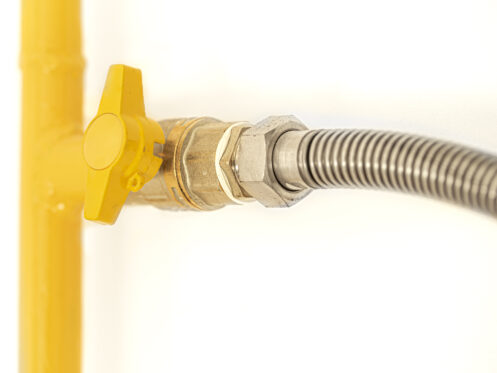Gas lines probably aren’t something that you think about very often. However, they are critical to your home’s safety and your health. Part of being a responsible homeowner is knowing when to schedule routine gas line inspections.
Keep You and Your Home Safe
Carbon monoxide (CO) poisoning, explosions and flames are all possible outcomes of gas leaks, making them very hazardous. Because it is neither smelly nor colored, CO can be hard to detect without the right tools. Inspections can help find leaks early and fix them before they result in hazards. Also, by checking the gas lines for corrosion and other issues, inspectors can fix them before they leak.
Stay in Compliance With Local Laws and Regulations
Another major justification for routinely inspecting gas lines is compliance with local rules and regulations. Gas line installation, maintenance and inspection are subject to strict regulations in many areas. To prevent legal trouble and possible penalties, get your system inspected regularly to make sure it conforms with these rules. Expert inspectors know the rules and regulations and can offer proof of compliance if requested.
Achieve Better Energy Efficiency
Did you know that you can improve your home’s energy efficiency by having your gas lines inspected regularly? Energy consumption and utility expenses go down when gas pipes and appliances are in top shape because they work more effectively. Inspecting for problems like leaks and obstructions allows you to fix them before they cause gas flow problems or cause appliances to work harder than needed. In addition to cutting costs, this lessens the toll that your home’s energy use has on the environment.
When Is the Best Time to Have the Gas Lines Inspected?
Most experts agree that you should have your gas lines inspected on a yearly basis. If you notice any of these warning signs, it’s important to get the lines inspected right away:
- Gas odor in your house or place of work
- Sounds of hissing near appliances or gas lines
- Higher gas costs despite no discernible increase in use
- Pilot light keeps going out
- Flames that are yellow rather than blue on gas stoves
Gas Line Inspection Process
There are several steps involved in inspecting gas lines. Hiring a professional is highly recommended since they have the correct tools and knowledge to perform the inspection safely.
Checking for Leaks
The professional will start by checking for leaks in the gas lines and appliances. If the specialist finds a leak, they’ll do their best to isolate it before starting the repair process. Experts can detect gas leaks in a number of ways, including:
- Applying pressure to the lines
- Using electronic gas detectors to find the exact spot of the leak
- Using a soap and water solution to find bubbles at the leak site
- Using thermographic imaging cameras to detect variations in temperature
Checking for Corrosion
Corrosion weakens gas lines and increases the likelihood of leaks. If the professional finds any rust, they’ll advise you on repairs or replacement. Repairing gas line corrosion requires expert skill to remove the damaged portions and replace them with new, corrosion-resistant materials like epoxy-coated steel or polyethylene. This will guarantee the safety and lifespan of the gas lines.
Checking for Proper Ventilation
To avoid CO accumulation, the expert will check the venting of any gas appliances and make adjustments as needed. For example, the professional might have to realign and securely connect the flue pipes. To further enhance airflow and guarantee efficient exhaust gas expulsion from the house, they may also install or modify vent dampers.
Checking for Proper Installation
Because gas lines and appliances pose a health risk if not placed correctly, the professional will double-check the installation. They might use a soap and water solution or some other method to ensure all connections are tight and leak-free. The specialist will also check the alignment of the appliances to ensure they meet manufacturer standards.
Checking for Code Compliance
The last step involves making sure the gas lines are in compliance with any applicable codes or regulations. A specialist will do this by checking the installation against current local safety standards and building laws. In addition to attesting to the gas system’s compliance, they will record the inspection’s findings in a report that notes problem areas.
It’s very important that you get a copy of this report. It records everything that’s happening with your gas system, including any problems that require fixing right away, which will help you avoid problems in the future. The report also serves as proof that your gas lines are in accordance with local standards. This is important for things like insurance and property transfers. An easy way to keep up with the reports is to put them in a folder labeled gas line inspection reports.
Gas Line Safety Tips
In addition to scheduling annual gas line inspections, there are several other precautionary measures that you can take to keep you and your home safe from gas leaks. Arranging a gas line inspection as soon as possible is crucial if you haven’t had one in the last 12 months.
Know the Signs of a Gas Leak
The safety of your house depends on your ability to recognize the warning signs of a gas leak. An easily noticeable sulfur-like stench, like that of rotten eggs, is one of the most common signs of a leak. There are a few other things you might notice: a white cloud or dust cloud near the line, dead vegetation surrounding the line or the sound of hissing or whistling. Gas leaks can sometimes manifest physically as vertigo, headaches, nausea or trouble breathing. If you are experiencing any of these symptoms, you should exit the home immediately, call for help and have a gas line professional perform a gas leak inspection.
Install Carbon Monoxide Detectors
At lethal concentrations, CO can be deadly. An important precaution to take is to set up CO detectors all throughout your house. When these devices detect CO, you can respond quickly before the levels are dangerously high. It’s best to install these detectors on each floor of your house, but particularly in bedrooms and near any gas appliances. Make sure the detectors are working correctly by testing them regularly and replacing the batteries annually.
Maintain Your Gas Appliances
Keep your gas range, water heater and furnace clean and in good working order by inspecting and servicing them regularly. Keep an eye out for damage or wear indicators like rust, cracks or loose connections, and fix them right away if you find any. Having a professional inspect and repair your appliances once a year is a good idea. This not only helps keep your home safer, but it also helps the appliances operate using as little energy as possible.
F.F. Hitchcock Plumbing, Heating & Cooling is here to meet all of your gas line inspection needs. We also help Cheshire, CT homeowners with AC and heater maintenance, drain cleaning, water treatment services and much more. To schedule a gas line inspection or plumbing repair for your home, contact us now.








